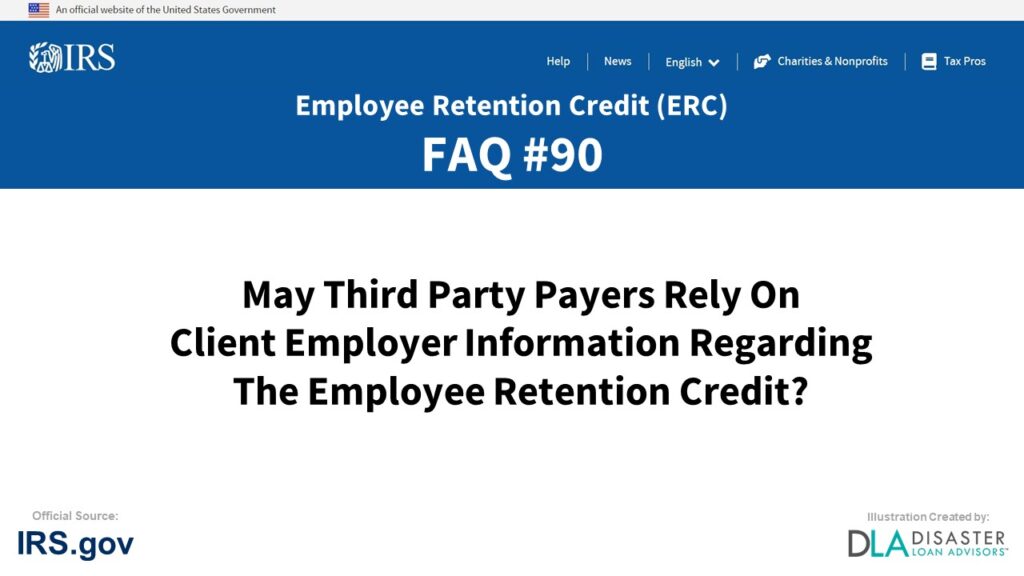
Frequently asked question #90 “May third party payers rely on client employer information regarding the Employee Retention Credit?” under the Special Issues for Employers: Use of Third Party Payers section of FAQs: Employee Retention Credit under the CARES Act, provided by the IRS.gov to help business owners understand the ERC program. Information is below for the question #90 May third party payers rely on client employer information regarding the Employee Retention Credit?
ERC Credit Frequently Asked Question #90:
COVID-19-Related Employee Retention Credits:
Special Issues for Employers FAQs
90. May third party payers rely on client employer information regarding the Employee Retention Credit?
If a third party payer is claiming the Employee Retention Credit on behalf of the client employer, the third party payer may rely on the client employer’s information regarding the client employer’s eligibility to claim the Employee Retention Credit, and the client employer may maintain all records which substantiate the client’s eligibility for the Employee Retention Credit.
However, upon request by the IRS, the third party payer must obtain from the client employer and provide to the IRS records that substantiate the client’s eligibility for the Employee Retention Credit.
The client employer and the third party payer will each be liable for employment taxes that are due as a result of any improper claim of Employee Retention Credits that are improperly claimed in accordance with their liability under the Internal Revenue Code and applicable regulations for the employment taxes reported on the employment tax return filed by the third party payer on which the credit was claimed.
For more Internal Revenue Service (IRS) Department of the Treasury Employee Retention Credit (ERC) Special Issues for Employers: Use of Third Party Payers FAQs, visit the official IRS.gov tax website.
Conclusion and Summary on ERC Credit FAQ #90. May third party payers rely on client employer information regarding the Employee Retention Credit?
The “May third party payers rely on client employer information regarding the Employee Retention Credit?” is Frequently Asked Question #90 of many commonly asked questions small business owners are wondering about how to file the Employee Retention Tax Credit (ERTC). The IRS ERC Tax Credit program is a confusing and complex process to determine the correct ERC calculations your business qualifies for. Answers to “May third party payers rely on client employer information regarding the Employee Retention Credit?” and filling out form 941-X may change slightly from frequently updated rules and regulations from the IRS. Leave a comment below if you have further questions on ERC Credit FAQ #90.
Help Completing / Filing / Claiming the Employee Retention Credit (ERC)
Receive Up to a $26,000 ERC Credit from the IRS Per Employee
Disaster Loan Advisors can assist your business with the complex and confusing Employee Retention Credit (ERC), Form 941-X, and the Employee Retention Tax Credit (ERTC) program.
Depending on eligibility, business owners and companies can receive up to $26,000 per employee based on the number of W2 employees you had on the payroll in 2020 and 2021.
The ERC / ERTC Tax Credit Program is a valuable IRS tax credit you can claim. This is money you have already paid to the IRS in payroll taxes for your W2 employees.
We DO NOT charge a percentage (%) of your ERC Refund like some companies are charging. Some ERC firms out there are charging upwards of 15% to 35% of your ERC refund!
Our professional ERC fee and pricing structure is very reasonable in comparison.
If you are looking for an ERC Company that believes in providing professional ERC Services and value, in exchange for a fair, reasonable, and ethical fee for the amount of work required, Disaster Loan Advisors is a good fit for you.
Schedule Your Free Employee Retention Credit Consultation to see what amount of employee retention tax credit your company qualifies for.
Cover Image Credit: Irs.gov / ERC FAQ / Disaster Loan Advisors.
